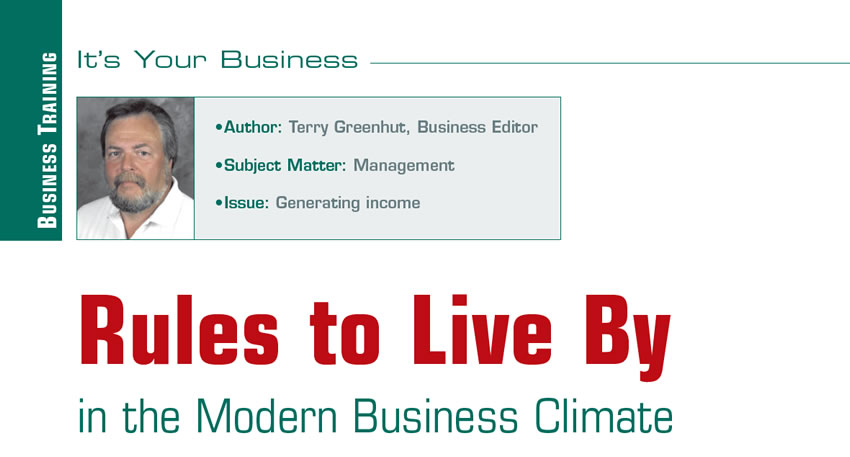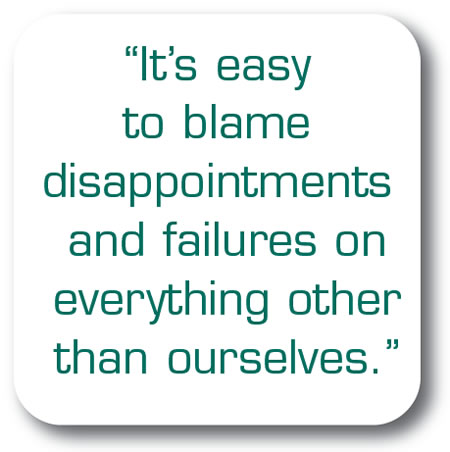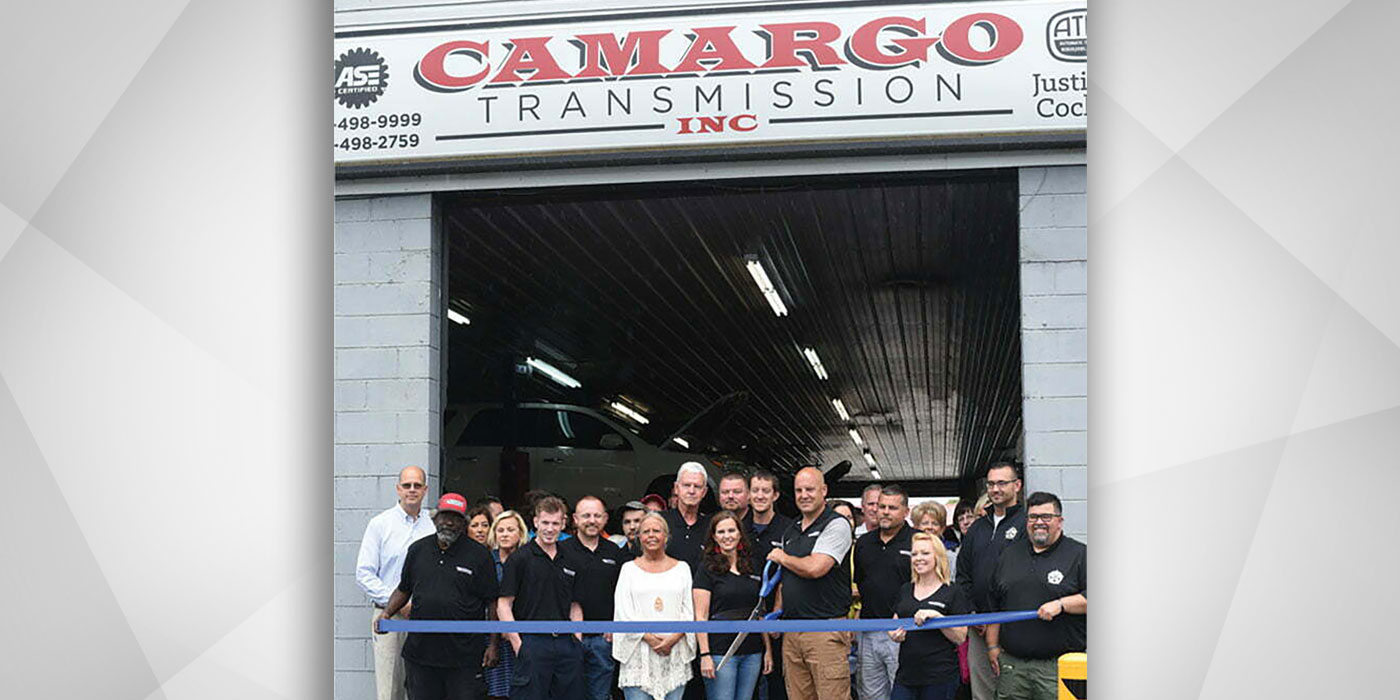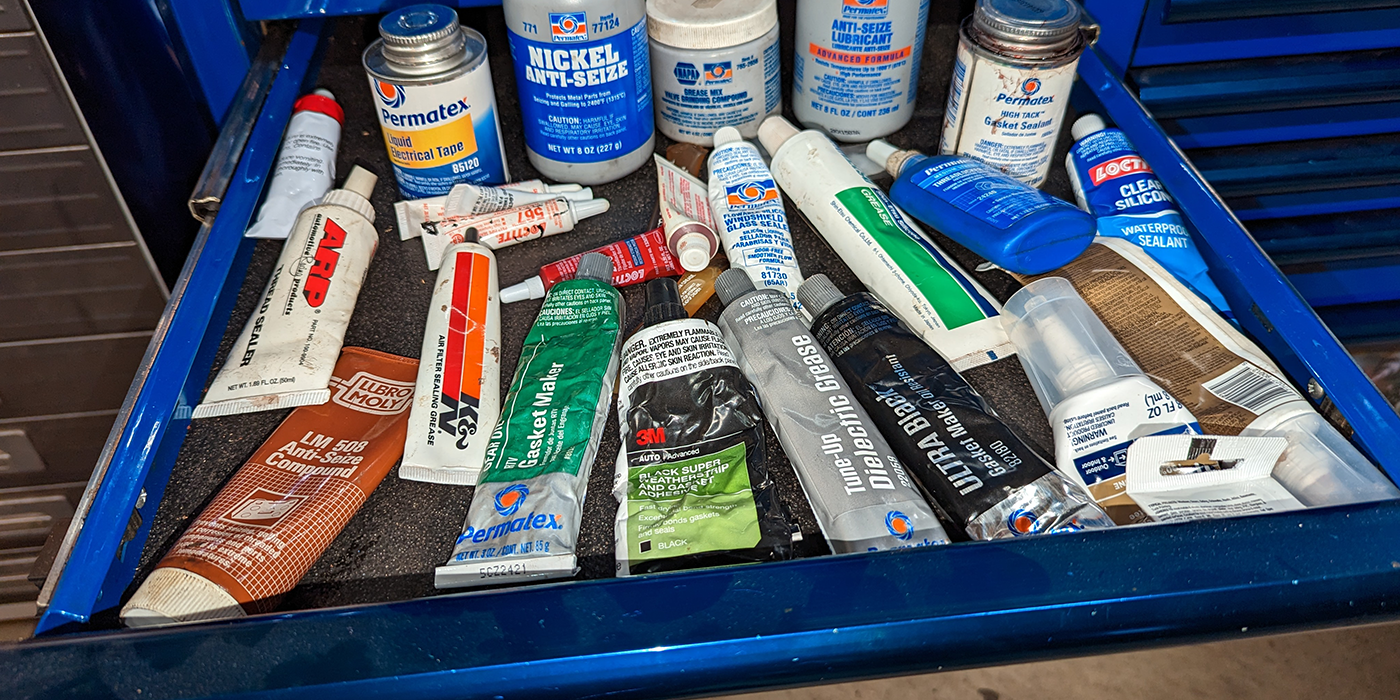
It’s Your Business
- Author: Terry Greenhut, Business Editor
- Subject Matter: Management
- Issue: Entrepreneurship
The New American Dream? What is it? How do we deal with it to survive and succeed?
There used to be a simple formula for building a good life: Go to school and make good grades, then go to college if you could afford to or a trade school to get you ready to face the world. You would then find a job with a good stable company, work hard, save money and maybe even start your own business one day. Finally, you might enjoy a decent (if not lavish) retirement. For years, the middle class has dutifully followed this path. OK, it wasn’t the most-exciting life but it paid the bills and maybe even allowed for a week or two of vacation every year.
Amazing how much can change in a decade or two. These days the traditional path leads only to daily stress, crushing debt and uncertainty about the future. The most-remarkable part is that so many people continue to blindly follow it when what we really need to do is make an about-face and learn how to think about work and wealth in a whole new way.
It’s time we realize, as a society and as individuals, that the traditional means of making a living has changed and that we need to change along with it. We really can’t rely on some big company swooping in, gathering up our college graduates and starting them out at $50,000 a year with all kinds of benefits. Does it still happen? Yes, but not with enough frequency to make a real difference to our economy. We need to make a huge mental shift back to the grass roots of making a living.
- We need to make a huge mental shift back to the grass roots of making a living.

This isn’t the first time in recent history that we’ve needed to modify the way we think about college and how it relates to the real-world aspect of making oneself a success. We had the same problem back in the early 1960s: not enough jobs to accommodate all the “baby-boomers” coming out of college. I know; I was one of them. So what did we do back then? Many of us learned trades and went to work in small shops making and repairing things that others would use. Some were fortunate to get jobs at different levels of government where salaries and benefits were guaranteed, but some struck out on their own, opening small businesses specializing in some form of service to others.
Entrepreneurship in one form or another flourished and still does today, maybe more than ever. Is it for everybody? No, but it creates jobs for so many more. In fact, it may be the only logical path to financial freedom in a global economy in which all the rules have changed.
First, let’s be clear: The entrepreneurship I refer to is not necessarily the “open your own shop and bust your butt working there seven days a week” variety, although many of you already do that. Rather, it centers on generating multiple streams of income (earned, passive and portfolio) so that the money you make is not all directly connected to the time you spend. If you are already in business for yourself it means learning to take the money you make and maximize it by having better control of how your business makes its money and how you as an individual invest yours.
- If you aren’t taking steps to change your reality, you forfeit the right to complain about it.
If you’re lucky enough to have your own shop or to work for a good business owner you might be able to scrape by on only that, but you might work yourself into an early grave. And, of course, if the job goes away, the money stops. It’s no way to live and no way to teach your children to live.
Anyone can make the leap to this form of entrepreneurship and, subsequently, financial freedom. Sure, you may have to learn new practical skills, but mostly it’s a matter of changing your mindset. Once you break free of “middle-class programming,” half the battle is won.

Here are 15 Universal Laws of Entrepreneurship for you to consider:
“I will always do exactly what I say I will do.”
Most of us do keep our word to others, or at least try to. And, of course, being trustworthy is critical to your success. (How else will we find investors and get return customers and referrals?) But what about the promises and pacts you make with yourself? Most people are far more likely to break agreements with themselves than they are with others. Yet since becoming an entrepreneur requires a dramatic change in both mindset and habits, you won’t get far if you keep letting yourself off the hook.
“I will take action in my life now!”
I’d like to build my wealth. I want to start my own business. It would be great to be in firm control of my financial future. These are nice, positive thoughts, but when they’re not paired with action, they are nothing but daydreams. Only action – not plans, not goals and not ambition – gets results. Every day that you don’t take a concrete step forward is another day of the status quo, another day of accepting a mediocre, humdrum life.
“I will remove all unconscious, negative and scarcity-based programming.”
The middle class has been “programmed” with belief systems that weren’t designed to help us attain wealth and that, indeed, barely work at all anymore. But because everyone around us is buying into the formula, we assume it’s the “right” way. Often, you’ll find that fear, not a rational reason, is holding you back. You need to evaluate and gradually reprogram your beliefs about the fear of investing, the availability of money and the lack mentality that is so common in our society. And as you begin to experience greater rewards, you’ll confirm the beliefs and actions that create wealth.
“I will remain aware that I am 100% responsible, 100% of the time, for the results in my life.”

It’s easy to blame disappointments and failures on everything other than ourselves. For instance: “I could be a lot wealthier if the economy hadn’t tanked.” Or, “How was I supposed to know that there would be a storm and I’d have to clean out my savings to replace my roof?” Although it’s true that you can’t always foresee or control what happens in your life, you can choose how you respond to those circumstances.
I know, life has a way of kicking in the door and derailing your plans. There are bills to pay, problems to solve and circumstances that need attention. You’ll have to deal with these issues, but you cannot allow them to stop you. Every day, you must make time to move toward the life of your dreams, no matter how small that step is. If you aren’t taking steps to change your reality, you forfeit the right to complain about it.
“I will invest in a financial-education program to master the skills of being an entrepreneur.”
For decades, American schools have taught (and are still teaching) students that they’ll need to give the best years of their lives to employers so that they can retire on 40% of their working salary. (That’s assuming they can get a good job at all in today’s economy, of course.) It stands to reason that if you want more out of life, you’ll need to seek some non-traditional education that will help you cultivate the skills that will enable you to generate multiple streams of income. You’ll need to learn about acquiring credit, using debt wisely, seeking (and persuading) investors, and marketing your products or services to buyers.
“I will remain coachable.”
History is filled with the tragic downfalls of leaders who got “too big for their britches,” refused to consider the advice and expertise of others, and ran their organizations and empires into the ground. Entrepreneurs, by nature, are go-against-the-grain types. It’s easy for them to assume they know best and disregard good advice from those who’ve been there. Don’t fall into this trap. Not only should you carefully consider advice, but you also should actively seek it out.
“I will stop doing minimum-wage activities.”
Our culture puts hard work on a pedestal. From sayings like “If you want the job done right, do it yourself” to the belief that the longer you stay at the office, the better employee you are, it’s clear that Americans think that spilling one’s blood, sweat and tears is a noble calling. Not so. If you don’t separate yourself from the mundane and the nitty-gritty, you might just micromanage your business away from success.
“I will always remember that time is more valuable than money.”
Chances are, you grew up being taught that the way to support yourself and to get ahead in life was to trade your time for money. In other words, if you spend 40 or more hours a week doing what your employer wants, you’ll be paid for 40 or more hours. But once those 40 hours are gone, they’re gone forever. So the question is: Did you do anything with those hours that builds your future or did you just trade them for a little bit of money?

It’s OK to put in a lot of time in the beginning. You have to establish systems that will do a good deal of the work for you later on, but eventually you’ll have these systems in place that allow you to profit from time put in by others and to reinvest your earnings so that you can generate even more income.
“I will maintain a credit score of 760 or higher.”
Your credit score is the gate standing between you and the success you dream of. That’s because lenders use credit-score ratings to control the amount of money in the marketplace. If they want to increase the flow, they lower qualifying scores. And if they want to decrease the flow, they raise those scores. As an entrepreneur, it’s crucial for you to be able to borrow money whenever you need it, regardless of what the market is doing.
- Your credit score is the gate standing between you and the success you dream of.
In 2011, the scoring for “A” credit was raised to 730. Therefore, you should choose to have A+ credit with a score of 760 or higher. Not only will this score allow you to borrow money any time, but it also means that you’ll qualify for lower interest rates. Overall, make it a priority to become a master at understanding, evaluating and controlling your credit score and credit availability so that you’ll never find the gate to the resources you need closed and locked.
“I will no longer view debt as negative, because I will use credit to invest so I can get out of destructive debt for the rest of my life.”
We’ve all heard the horror stories: families so sunk in consumer debt they were forced to declare bankruptcy and individuals whose educational debt haunted them for the rest of their lives. In part because of these cautionary tales, we’ve been programmed to believe the only route to financial freedom is becoming debt free. It might be time to reprogram that belief.
It’s not that debt itself is bad; it’s the type of debt that’s important. When you borrow money at 4% to invest it in something that makes 10%, that’s good debt. The money is working for you. When you run up your credit-card debt because you had to have that new TV that you really don’t have the money to buy and pay 30% interest, that’s bad, destructive debt. From this day forward, commit to using debt to invest and build your wealth. Yes, debt can be financial quicksand. But used wisely, it can also give you leverage and make you rich.
“I will no longer listen to people who are not where I want to be financially.”
The saying “Those who cannot do, teach” does not apply to building wealth. It would be foolish to take financial advice from someone with one stream of income who consistently lives paycheck to paycheck (Newsflash: That’s most people), or to adopt a wealth-building strategy from an entrepreneur whose business is constantly in the red.
I’ve noticed that the people with the least amount of money tend to have the most advice. Don’t listen to them! Instead, seek advice only from those who are where you want to be financially.
“I will fulfill the unmet needs of others.”
You may have the best shop in the area, but if the surrounding neighborhood doesn’t have enough vehicles in need of service or repair, your shop will flop. Yes, it’s a simplistic example, but the principle behind it holds true: If your business doesn’t address and fulfill an unmet need, it’s not going to be successful – period. And in today’s highly competitive world with a business on every corner, it’s critical to identify what others aren’t doing (or aren’t willing to do!) so that you can compete and win customers.
“I will always be on time.”
You might think rushing into an appointment a few minutes late isn’t a big deal. If so, you’re wrong. For one thing, lateness, especially if it’s chronic, increases stress levels and causes you to be in a more-frazzled state of mind than might otherwise be the case, but – even more important – lateness is a character issue.
When you’re late to a meeting, you’re being disrespectful to others, because by not managing your time well you’re wasting theirs. Plus, if you’re late to a more-private appointment, you will have to work through what is essentially a broken agreement before you can progress any further. If you recall, not breaking agreements is a cornerstone of all the Universal Laws of Being an Entrepreneur. When you’re not on time, you’re breaking your word to yourself and the others in the meeting. Do it a few times and they may never trust you again.
“I will become a master at creating systems and processes.”
This is all about building a business that runs, and can continue to run, effectively and efficiently. Why? Because you don’t want to have to spend your oh-so-valuable time reinventing the wheel and micromanaging others.
“I will build the right relationships with the right power-team members.”
If you’re truly working toward creating wealth, you’re not going to be building one small business that you personally operate and run. Instead, you’ll be creating multiple, duplicable small businesses that are constantly creating new streams of income for you. You’ll need to be able to hand off tasks and duties to others. And that means you’ll need a strong team of the right people doing the hard work for you.
Your team is the power behind your skill as an entrepreneur. That’s why it’s critical to evaluate these people personally and make sure they’re right for the job. No warm bodies here. Everyone you pay money to has to enhance your opportunity to make money. If they don’t, you don’t need them. Go find people who will.
- What it all comes down to is that life is really just a series of choices.
What it all comes down to is that life is really just a series of choices. We decide whether to watch TV after work or spend an hour on our action plan, whether to take the class or not take the class, whether to hold the cards or place the bet. Most people take the path of least resistance and go with the herd. Those who don’t are the ones who will create rich, full lives that are truly worth living.

Terry Greenhut, Business Editor. Visit www.TerryGreenhut.com













